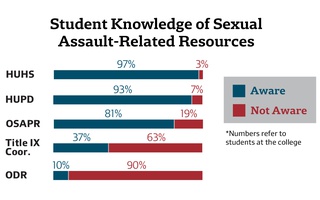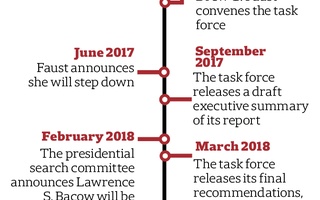A University-wide task force on inclusion and belonging is set to release recommendations one semester earlier than planned, according to Government professor Danielle S. Allen, one of the task force’s co-chairs.
Formed in 2016, the body was initially set to work through spring 2018. Instead, Allen said the task force will submit a report to University President Drew G. Faust by the end of the fall semester.
Task force member and Undergraduate Council Vice President Cameron K. Khansarinia ’18 said Faust’s decision to step down from her post in June precipitated the change in schedule.
“[Faust] was really the impetus behind this task force,” Khansarinia said. “The task force reports directly to her. She has a huge stake in this game and she really believes in it. I think the task force chairpeople really wanted to deliver something to her desk before she leaves the presidency.” {shortcode-8908a2741a615157948115b2a9da7f5a94c370a1}
William Oh ’18, another member of the task force, also said the possibility of a new president changed the group’s calculus.
“The two options I think the task force is faced with is either speed up or significantly slow down,” Oh said. “With the original timeline, there is a lot of uncertainty in the sense that we don’t know who the next Harvard president is and, if this report is completed by the original timeline, the report will be the first thing to land on that new president’s desk.”
Faced with an earlier deadline, the task force must speed up its deliberation process. They will meet at a retreat on Sept. 9 to come to a consensus on their various findings, according to Vice President of Campus Services and task force co-chair Meredith L. Weenick.
“We are all convening for the whole day to discuss preliminary recommendations and really flesh out the solutions,” Oh said. “The general consensus is that we are intending to speed up the work to hopefully complete it by the winter or have it ready by early next spring.”
In the announcement of the task force’s formation, Faust defined four areas of focus for the group—demographics, institutional culture, academic resources, and existing diversity organizations at Harvard. Weenick summarized Faust’s charge as working “not only bring people together from diverse perspectives and backgrounds”, but also “to make sure that people can really participate to the best for their ability and have all the elements to their success and therefore our collective success.”
Since its formation, the task force has worked to gather information through surveys, school-wide data sets, and “on-site sessions with leadership teams,” according to Weenick. The task force also solicits recommendations through a “solution space” on their website.
In April, at an event billed “Afternoon of Engagement on Inclusion and Belonging,” the task force drew attention—and some criticism—for announcing the replacement of the last line of “Fair Harvard,” the University’s 181-year-old alma mater.
Although the final recommendations are still in flux, Oh said he hopes the task force releases recommendations that can address all of a “decentralized Harvard.”
“I would call the work of a task force a success if ... we are able to update the University’s structures... to be able to respond to the needs of the different constituencies of the university: faculty, staff, students,” he said.
—Staff writer Alice S. Cheng can be reached at alice.cheng@thecrimson.com. Follow her on Twitter at @alicescheng.
—Staff writer Kristine E. Guillaume can be reached at kristine.guillaume@thecrimson.com. Follow her on Twitter @krisguillaume.
Read more in University News
Faust Denounces 'Cruel' DACA DecisionRecommended Articles
-
 Grappling with Campus Sexual Assault, Harvard Looks to Expand Prevention Efforts
Grappling with Campus Sexual Assault, Harvard Looks to Expand Prevention Efforts -
Individual Schools Take Up Sexual Assault RecommendationsAfter finishing its work earlier this month, the Task Force on the Prevention of Sexual Assault has disbanded, leaving Harvard's 12 schools to act on its recommendations.
-
 Diversity Task Force Releases Draft Report
Diversity Task Force Releases Draft Report -
 The Diversity Task Force Report, Analyzed
The Diversity Task Force Report, Analyzed -
 Diversity Task Force Report Reflects Feedback, Students Say
Diversity Task Force Report Reflects Feedback, Students Say













